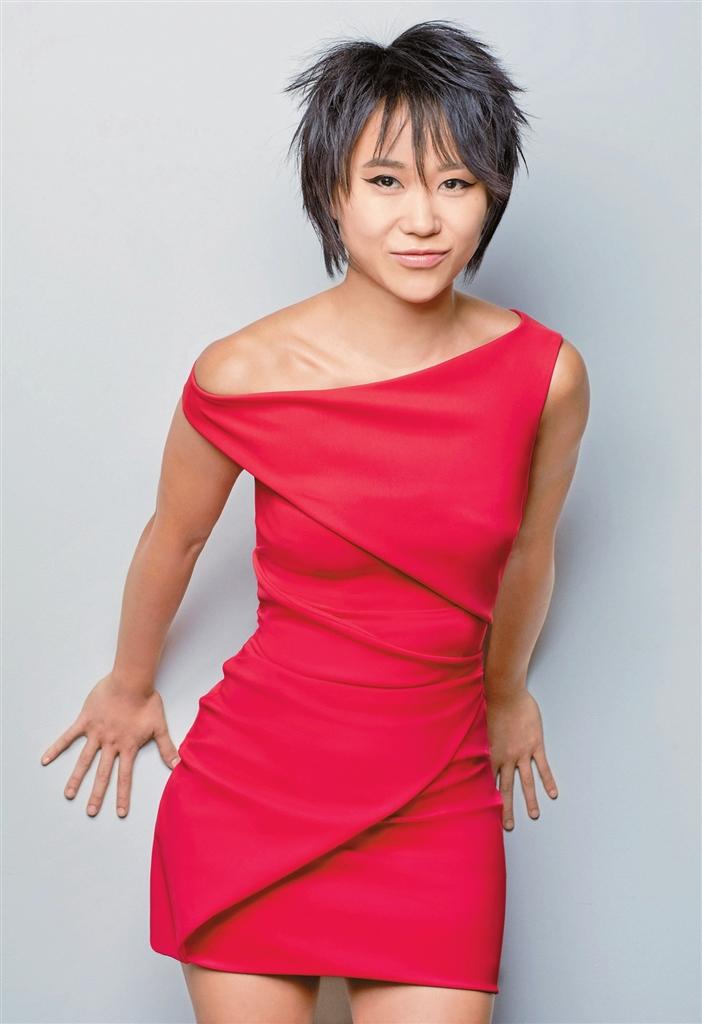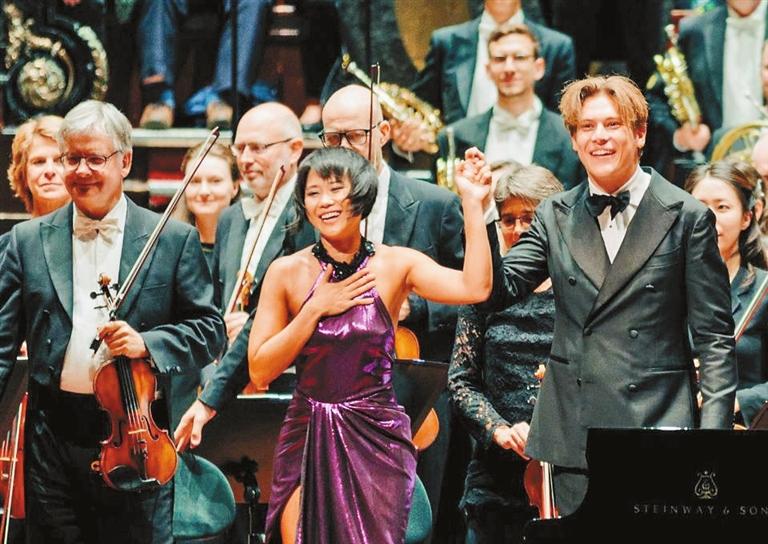

SIX days ahead of her 37th birthday, Beijing-born pianist Yuja Wang accomplished another milestone of her life — becoming the first Chinese pianist to win a Grammy Award. Winners of the 66th Grammy Awards were announced Sunday, and the Deutsche Grammophon artist was awarded in Best Classical Instrumental Solo — one of the leading classical categories — for the album “The American Project,” alongside conductor Teddy Abrams. On collecting the award during the ceremony, Abrams said: “A huge congratulations to the incredible Yuja Wang, who’s soloed on this extraordinary album. Yuja is one of the most talented musicians on the face of the earth right now.” Composed and conducted by Abrams and performed by Wang, “The American Project” premiered during the Louisville Orchestra’s Coffee Concert on Jan. 7, 2022, and was recorded live the following day in Whitney Hall at the Kentucky Center for the Performing Arts. As students together at the Curtis Institute of Music in Philadelphia, the United States, Wang and Abrams formed a duo for lessons. Wang, the budding star pianist, would practice as a soloist with big concertos by Rachmaninov or Prokofiev, while Abrams played the orchestral part on a second piano. The friendship endured and they have now reunited for Abrams’s “Piano Concerto,” which was given its premiere by Wang. At about 40 minutes, it occupies the major part of “The American Project,” together with a short solo item composed by Michael Tilson Thomas. Even without an explicit connection being made, it would be obvious that Abrams’s “Piano Concerto” follows in the line of Gershwin’s “Rhapsody in Blue.” The idea of a jazz-themed showpiece for piano and orchestra caught the public imagination when Gershwin’s work was first heard in the 1920s and Abrams’ concerto was originally conceived as a companion piece for it. In the course of composition, the concerto “blossomed” beyond its intended scale. Big band orchestral writing jostles with Latin American, gospel, Hollywood-like themes and several cadenzas in the classical style, which show off Wang’s glittering finger-work. Nothing lasts long and the concerto is held together by its energy. It gets a flamboyant performance from Wang and Abrams, who conducts the Louisville Orchestra, enough to make a glitzy, if fleeting impact in a live concert. A born pianist Wang is one of the most exciting pianists of the 21st century, frequently selling out world-renowned concert halls across the globe. One of the most dynamic performers on the classical music scene today, she has dominated the stage since her 2007 breakthrough, aged 21, when she stepped in for Martha Argerich as piano soloist with the Boston Symphony Orchestra. Two years after that performance she signed an exclusive recording contract with the esteemed classical “yellow” label, Deutsche Grammophon, and her career has progressed in leaps and bounds since. With high-profile brand partnerships including Rolex and Steinway, multiple world premieres and four Grammy nominations and one win, she shows no signs of slowing down, and with all her magnetic energy, charm and charisma, there must only be great things to come. The pianist currently lives in New York. Her parents, who still live in Beijing, both pursued creative careers: Her mother is a dancer and her father is a percussionist. Wang began to play the piano at 6, encountering the instrument in the family home after it was given to her parents as a wedding gift. Her ballet dancer mother would also bring her to rehearsals of “Swan Lake” and other performances, nurturing an interest in the Russian Romantics. Anecdotes abounded regarding Lang Lang, a well-known Chinese pianist and graduate of Curtis, and the strict control exerted by his father, who enforced long hours of practice during his childhood. In contrast, Wang appeared to have naturally enjoyed playing from a young age. At 7, Wang studied at the Beijing Central Conservatory. She moved to Calgary in Canada at 14 to study at the Mount Royal Conservatory, and in the following year, entered the Curtis Institute of Music, graduating five years later in 2008. She hasn’t given a specific number when asked how many hours she practices nowadays, and the truth is probably that it varies a lot depending on her schedule. You don’t get to be a pianist of her stature without putting in hours of hard work. But once a performer leaves full-time education and embarks on a performing career, practice opportunities can be few and far between. Wang has also said that much of the “practice” she does nowadays is mental, familiarizing herself with a piece and refining her interpretation of it. In an interview shortly after the COVID-19 pandemic, Wang revealed that she didn’t practice for an entire year: “I’m not very big on practice because I always have procrastinated.” The pianist revealed that she “had no motivation” without her regular concert schedule, and would “rather cook, read or watch a movie.” Virtuosity and stage glamour The pianist is best known for her virtuosic piano artistry, in particular for her Rachmaninoff interpretations, as well as her magnetic stage presence, and a stylistic flair in her concert appearances, which often include a costume change during the interval. In January 2023, Wang undertook a Rachmaninoff “marathon,” performing all four concertos in addition to the composer’s “Rhapsody on a Theme of Paganini” in a three-and-a-half-hour concert at New York’s Carnegie Hall, alongside the Philadelphia Orchestra and conductor Yannick Nézet-Séguin. The following month, she joined the Los Angeles Philharmonic and Gustavo Dudamel for their Rachmaninoff Festival, performing the same works across five concerts, which were recorded by Deutsche Grammophon and released to high acclaim in September. With the Rachmaninoff “marathon,” the pianist meant to create an experience that would test the attention span of audiences in the TikTok era, “a stamina test for the audience as well,” in her own words. She recalled listening to Wagner’s “Ring” as a student at Curtis for hours on end and walking away with new admiration for “a past human being’s work and their effort and what they’re trying to express.” The challenge also had a virtuosic appeal for Wang, an inveterate thrill-seeker who has learned to Jet Ski and dabbled in cryotherapy. She said that performing the works in one go gave her “lots of ego”: “It’s like, Yes, I can play them!” When it comes to more “Germanic” piano repertoire — by the likes of Bach, Mozart and Beethoven — Wang says she needs more time. Their music, she told The New York Times, “needs much more maturity and growing as a person. I can play it for sure, but it’s not at the quality that I want. “Everyone plays it, and if I don’t bring something meaningful to it, then I might as well not play it at all.” Wang is also known for her captivating stage presence and dazzling performance outfits. A fan of bright colors, sequins, and signature platform Louboutins, Wang’s usual stage attire is as striking to the eyes as her music is to the ears. An enchanting performer from the moment she steps on stage to her stylish, almost balletic, final bows, Wang has previously told The Guardian: “If the music is beautiful and sensual, why not dress to fit? It’s about power and persuasion.” And she reminisced about the energy she had in her 20s, when she said she could stay out late drinking and still perform at 11 the next morning. But now, she said, she feels a more profound connection with the music, especially since 2022, when she began dating conductor Klaus Mäkelä. At 28, Mäkelä is the chief conductor of the Oslo Philharmonic, music director of Orchestre de Paris and artistic partner to the Concertgebouw Orchestra in Amsterdam. She has taken him to meet Gary Graffman, her teacher, who offered his approval. “When the love part is going well,” she said, “the music has a deeper meaning than just a release of emotions.”(SD-Agencies) | 
